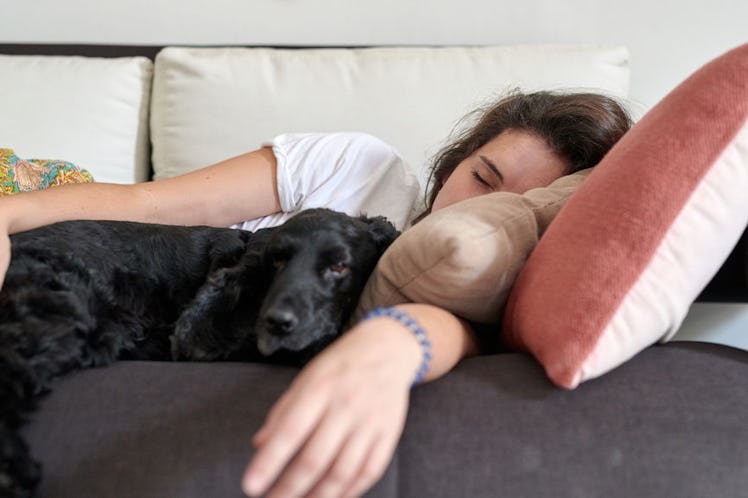
Science Says Naps Have This One Awesome Benefit For Your Brain, So Snooze Away
Remember when you were little, maybe 3 or 4 years old, and your parents would put you down for a nap? As in, they’d rock you to sleep, in the middle of the day, on purpose? Then you blinked, and the unthinkable happened: Time flew, you grew up, and all of a sudden, taking frequent naps was a stamp of "laziness." Well, whoever decided that those who snooze, lose, was sorely mistaken, my friend. According to new research, the way naps affect your brain is not only pretty remarkable, it’s extremely positive, and can even be beneficial on days when you’re tasked with making a difficult decision. So the next time your brain’s feeling a little foggy, and too much information is being thrown your way with very little time to process it all, you might want to consider catching some Z’s, because the more time your brain has to rest and collect itself, the better.
The National Sleep Foundation recommends the average adult clock in between seven to nine hours of sleep per night. On paper, this window of time sounds manageable, right? But, unfortunately, when you’re juggling a heavy workload, class assignments, a social calendar, and trying to squeeze some self-care into your schedule, somehow sleep gets pushed down to the bottom of your priority list. Personally, I’m in no position to wag my finger at you for putting everyday responsibilities at the top of your to-do list because, TBH, I’m the same way. In fact, according to research published back in February 2016 as part of the Centers for Disease Control and Prevention’s Morbidity and Mortality Weekly Report, as many as one in three American adults don't get enough sleep per night.
The problem is, sleep is essential for your brain to be able to properly process information, store memories, keep your immune system healthy, and maximize your ability to stay alert and energized the following day, Dr. Sujay Kansagra, Mattress Firm’s sleep health expert, tells Elite Daily. If you aren’t sleeping enough, he explains, the brain doesn’t have enough time to go through this process, which ends up negatively affecting your physical body, as well as your mental state, in the long run. In this case, Dr. Kansagra says, developing a healthy nap schedule can actually supplement that lack of sleep, and help you function properly.
New research has further proven Kansagra's theory, too. According to a recent study published in the Journal of Sleep Research and performed by researchers at the University of Bristol, naps affect the brain by giving it an opportunity to process information and enhance your problem-solving skills. In other words, when you simply cannot make up your mind about something on the spot, “sleeping on it” isn’t such a ridiculous idea after all.
For their study, researchers recruited 16 healthy participants "across a range of ages," according to ScienceDaily, to complete two tasks: One was a “masked” prime task — in which researchers briefly slipped information into a presentation to see whether or not participants would pick up on the subliminal messages — and the second required participants to to respond when a red or blue square showed up on a screen. In between rounds, participants were either asked to stay awake, or take a 90-minute cat nap to regroup.
According to the results, the researchers found that those who slept in between tasks processed the subliminal messages in the masked prime tasks better than those who stayed awake throughout the experiment. In other words, taking naps seemed to improve the way their brains functioned.
It's a pretty sweet deal that naps are good for your brain, but what exactly is going on physiologically around the noggin that makes you think so much more clearly when you wake up from a nap? Alesandra Woolley, executive editor of Mattress Advisor, breaks it down like this: There are five stages of sleep, and the first four are all light sleep stages, while the fifth stage is REM sleep — aka the part of your sleep cycle when you experience rapid eye movement, dreams, and more intense brain stimulation, Woolley tells Elite Daily. And as long as your nap goes through stages one through four, Nightfood scientific advisor, Dr. Michael Breus, adds, the brain will be able to “filter information” and “recognize what is important.”
OK, so now that you know you have to at least sleep your way through stage four, how long do you actually need to snooze in order to accomplish that? According to Dr. Nate Watson, a SleepScore Labs advisory board member, you should aim to take short naps (about 15 minutes) rather than long naps (upwards of one hour and 15 minutes). This way, "you get the same refreshing benefits of a longer nap without risking sleep inertia (grogginess) when you wake up out of a deeper stage of sleep," he tells Elite Daily.
Of course, you shouldn't rely solely on naps in order to get enough sleep to support your brain health. The bottom line is this: It really is better for your body to get the recommended seven to nine hours of shut-eye every night. However, if, for some reason, you stayed up a little later than you'd originally intended to, feel free to lean on a nap when necessary. It's not exactly an ideal situation, but clearly naps are better than no naps when you're sleep-deprived, so if you can snooze for a few minutes during the day, that's a win in my book.